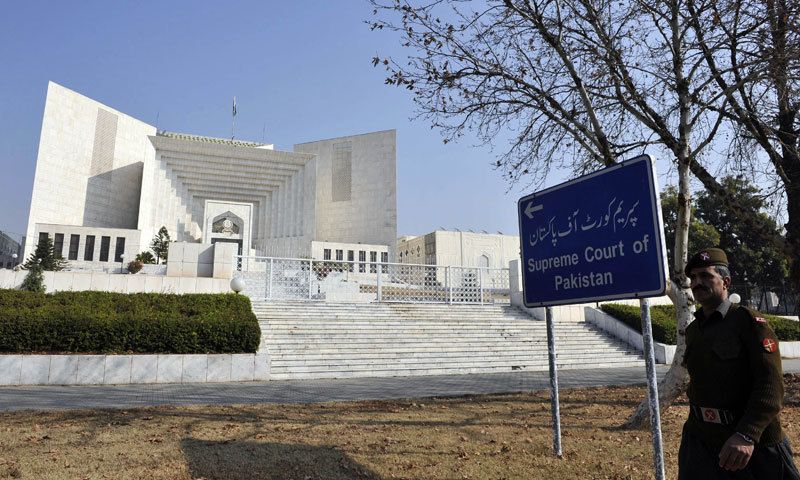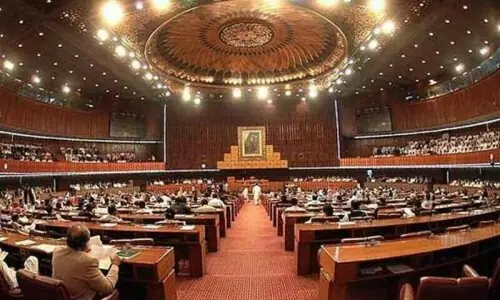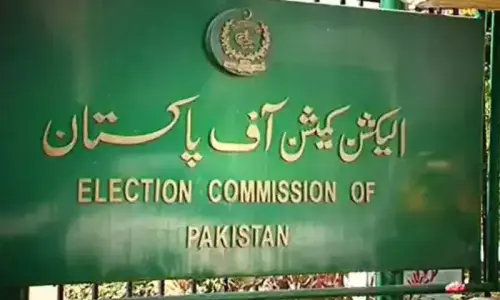ISLAMABAD: The Supreme Court hearing a set of petitions seeking disqualification of Prime Minister Nawaz Sharif indicated on Monday that it would examine the constitutional bar on the court from questioning the proceedings in parliament.
“Come prepared after going through Articles 68, 69 and 95 of the Constitution,” Justice Mushir Alam asked the petitioners’ counsel at the conclusion of the proceedings.
A three-judge bench headed by Justice Jawwad S. Khawaja had taken up the petitions filed by PTI’s central committee leader Ishaq Khan Khakwani, PML-Q chief Chaudhry Shujaat Hussain and Advocate Gohar Nawaz Sindhu.
While Article 68 protects the superior court judges from being discussed in parliament, Article 69 bars superior courts from inquiring into or questioning the proceedings of parliament on the ground of any irregularity of procedure. Article 95 suggests removal of the prime minister from his office through a vote of no-confidence moved by not less than 20 per cent of the total membership of the National Assembly.
The petitioners requested the court to order disqualification of the prime minister for allegedly falsely stating in a joint session of parliament on Aug 29 that the government had not asked the army to mediate and become a guarantor between the government and protesting PTI and Pakistan Awami Tehreek to end the political impasse.
At the outset, senior lawyer Irfan Qadir, representing Mr Khakwani and Chaudhry Shujaat, argued that the Supreme Court had disenfranchised a number of parliamentarians by disqualifying them and, in a similar manner, the Election Commission should also be directed to de-notify the prime minister from his seat.
The counsel referred to the disqualification of former prime minister Yousuf Raza Gilani on June 19, 2012, by a three-judge bench headed by then chief justice Iftikhar Muhammad Chaudhry. Similarly, a number of parliamentarians had to lose their seats for holding dual nationality.
Advocate Gohar Sindhu said he had filed an appeal against the Lahore High Court’s Sept 8 judgment and also moved an intra-court appeal seeking disqualification of the prime minister as well as a direction restraining him and Interior Minister Chaudhry Nisar Ali Khan from holding their offices till the case against them was decided.
He requested the apex court to constitute a larger bench to hear the important case which also had political undertones.
But the court asked him to submit a suitable application since it was a prerogative of the chief justice to take a decision on the request.
In their petitions, Ishaq Khakwani and Chaudhry Shujaat said the prime minister had stated in the National Assembly on Aug 29 that he had asked Chief of the Army Staff Gen Raheel Sharif to act as a mediator and guarantor between the government and PTI Chairman Imran Khan and PAT chief Dr Tahirul Qadri for ending the impasse.
Consequently, the army chief separately met the two protesting leaders who insisted that they would not back down from their demand for the prime minister’s resignation.
The petitioners said that when the prime minister realised that his plan had failed and the move was not welcomed by certain political quarters, he denied in the assembly that he had ever asked the army chief to mediate and stated that the army was dealing with such issues without the government having desired it to do so.
By making two different statements, they alleged, Mr Sharif tried to malign and damage the fair image of the army in violation of Article 62 (g) of the Constitution.
An army spokesman also confirmed that it was the government which had asked the army chief to play a role in ending the standoff.
This, the alleged, established that Nawaz Sharif had made a false statement concerning the army chief and, therefore, was liable to be proceeded against under Article 62 (f) of the Constitution.
The article deals with the qualification of a person from becoming a parliamentarian if he is not sagacious, righteous, honest and Ameen.
The court postponed the proceedings for Thursday.
Published in Dawn, September 30th, 2014


































